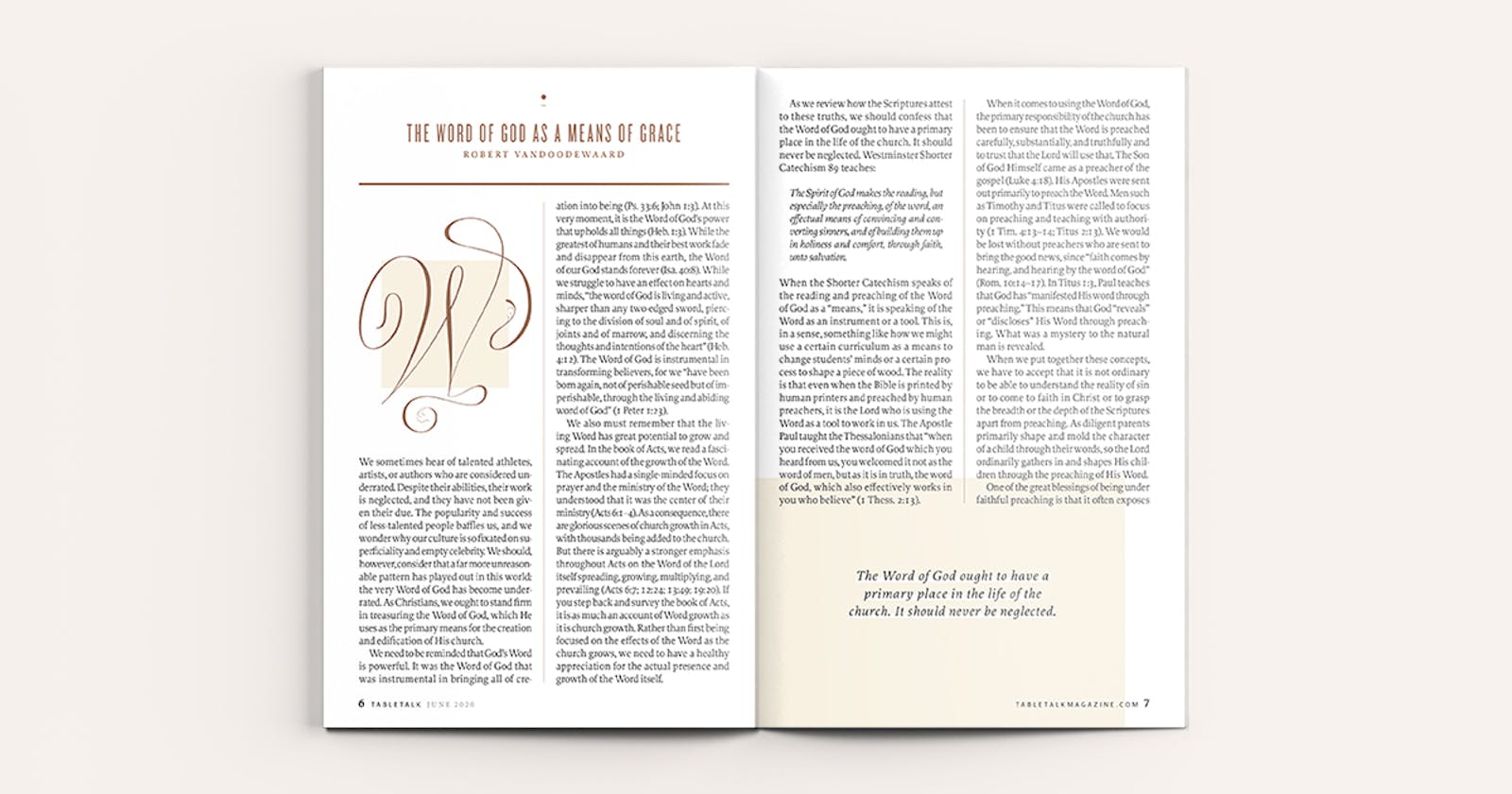
Request your free, three-month trial to Tabletalk magazine. You’ll receive the print issue monthly and gain immediate digital access to decades of archives. This trial is risk-free. No credit card required.
Try Tabletalk NowAlready receive Tabletalk magazine every month?
Verify your email address to gain unlimited access.
We sometimes hear of talented athletes, artists, or authors who are considered underrated. Despite their abilities, their work is neglected, and they have not been given their due. The popularity and success of less-talented people baffles us, and we wonder why our culture is so fixated on superficiality and empty celebrity. We should, however, consider that a far more unreasonable pattern has played out in this world: the very Word of God has become underrated. As Christians, we ought to stand firm in treasuring the Word of God, which He uses as the primary means for the creation and edification of His church.
We need to be reminded that God’s Word is powerful. It was the Word of God that was instrumental in bringing all of creation into being (Ps. 33:6; John 1:3). At this very moment, it is the Word of God’s power that upholds all things (Heb. 1:3). While the greatest of humans and their best work fade and disappear from this earth, the Word of our God stands forever (Isa. 40:8). While we struggle to have an effect on hearts and minds, “the word of God is living and active, sharper than any two-edged sword, piercing to the division of soul and of spirit, of joints and of marrow, and discerning the thoughts and intentions of the heart” (Heb. 4:12). The Word of God is instrumental in transforming believers, for we “have been born again, not of perishable seed but of imperishable, through the living and abiding word of God” (1 Peter 1:23).
We also must remember that the living Word has great potential to grow and spread. In the book of Acts, we read a fascinating account of the growth of the Word. The Apostles had a single-minded focus on prayer and the ministry of the Word; they understood that it was the center of their ministry (Acts 6:1–4). As a consequence, there are glorious scenes of church growth in Acts, with thousands being added to the church. But there is arguably a stronger emphasis throughout Acts on the Word of the Lord itself spreading, growing, multiplying, and prevailing (Acts 6:7; 12:24; 13:49; 19:20). If you step back and survey the book of Acts, it is as much an account of Word growth as it is church growth. Rather than first being focused on the effects of the Word as the church grows, we need to have a healthy appreciation for the actual presence and growth of the Word itself.
As we review how the Scriptures attest to these truths, we should confess that the Word of God ought to have a primary place in the life of the church. It should never be neglected. Westminster Shorter Catechism 89 teaches:
The Spirit of God makes the reading, but especially the preaching, of the word, an effectual means of convincing and converting sinners, and of building them up in holiness and comfort, through faith, unto salvation.
When the Shorter Catechism speaks of the reading and preaching of the Word of God as a “means,” it is speaking of the Word as an instrument or a tool. This is, in a sense, something like how we might use a certain curriculum as a means to change students’ minds or a certain process to shape a piece of wood. The reality is that even when the Bible is printed by human printers and preached by human preachers, it is the Lord who is using the Word as a tool to work in us. The Apostle Paul taught the Thessalonians that “when you received the word of God which you heard from us, you welcomed it not as the word of men, but as it is in truth, the word of God, which also effectively works in you who believe” (1 Thess. 2:13).

When it comes to using the Word of God, the primary responsibility of the church has been to ensure that the Word is preached carefully, substantially, and truthfully and to trust that the Lord will use that. The Son of God Himself came as a preacher of the gospel (Luke 4:18). His Apostles were sent out primarily to preach the Word. Men such as Timothy and Titus were called to focus on preaching and teaching with authority (1 Tim. 4:13–14; Titus 2:13). We would be lost without preachers who are sent to bring the good news, since “faith comes by hearing, and hearing by the word of God” (Rom. 10:14–17). In Titus 1:3, Paul teaches that God has “manifested His word through preaching.” This means that God “reveals” or “discloses” His Word through preaching. What was a mystery to the natural man is revealed.
When we put together these concepts, we have to accept that it is not ordinary to be able to understand the reality of sin or to come to faith in Christ or to grasp the breadth or the depth of the Scriptures apart from preaching. As diligent parents primarily shape and mold the character of a child through their words, so the Lord ordinarily gathers in and shapes His children through the preaching of His Word.
One of the great blessings of being under faithful preaching is that it often exposes us to unexpected truths, corrections, and encouragements. Left to ourselves and our own ideas, we tend to end up living or learning according to our own preferences. In some cases, this can result in selected parts of the Scriptures being abused. Being under regular expository preaching, which covers the breadth of Scripture over time and brings to us old things and new, will give the believer a healthy spiritual diet. Having a preacher who knows the needs and concerns of a congregation will result in guidance that may be challenging but will ultimately restore our souls and lead us into “paths of righteousness” (Ps. 23). Fifteen times the New Testament tells us, “He who has ears to hear, let him hear.”
Scripture also points us to the blessing of our personal use of the Word of God as a means of grace. The need for preaching does not mean that believers do not also benefit from studying the Word on their own. The psalmist woke up early to pray and to read the Word (Ps. 119:147–48). The “fair-minded” Bereans searched the Scriptures daily (Acts 17:11). Careful and diligent reading will equip you to listen with discernment to preaching. A steady and consistent diet of personal Scripture reading will make you complete and will equip you “for every good work” (2 Tim. 3:17). It will also continually correct you and reprove you (v. 16), which may be difficult but is necessary. It will point you to your need for Christ often, make you “wise for salvation,” and give you a foundation for doctrine and Christian living (vv. 15–16).
When you read the Bible or listen to faithful preaching, there is more happening than mere communication of ideas. The Word is more than ink and paper, and preaching is more than a speech. The Word is living, as the Lord is working effectually by His Holy Spirit through it. There are many pictures of this in Scripture: the Lord through His Word is sowing imperishable seeds (1 Peter 1:23), bringing about repentance and faith (Rom. 10), feeding our souls with the Bread of Life (Matt. 4:4; John 6:35), creating a source of living waters in our hearts (John 7:38), and washing His church (Eph. 5:26). To have the Word abide in us is to be in union with Christ and to be conformed to His will so that we learn to desire what is godly and holy (John 15:7). This means that the Word is an incomparably precious and powerful gift of God to us as He works through it. In the Word we encounter Christ, and encountering Christ, we commune with Him.
Finally, there is for the Christian a great reassurance in the fact that the Word of God does not change. We live in a world where change in itself is seen as virtuous, including many unwise changes to morals, ethics, and lifestyles. Trends come and go. But we can be thankful that, as people of the Book, we confess the same Word as the church of all ages. The Word of God has not lost its significance or its power as a means of grace. It continues to grow and spread across many parts of the earth. “The grass withers, the flower fades, but the word of our God will stand forever” (Isa. 40:8).
